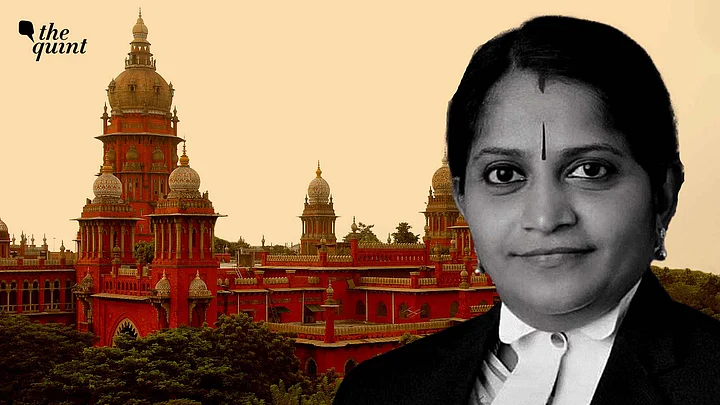The controversy over the appointment of Victoria Gowri as an additional judge of the Madras High Court once again shows us the glaring weaknesses of the collegium system of appointment of judges.
The controversy is not about her political affiliation.
Though she was a member of the Bharatiya Janata Party (BJP) and an assistant solicitor general (appearing on behalf of the Union Government) in the Madurai Bench of the Madras High Court, neither of these are per se disqualifying factors in considering a candidate for the judgeship of the High Court.
Several eminent judges of the Madras High Court and the Supreme Court have been members of political parties prior to their elevation as judges, even holding political office. Judges from across the ideological spectrum in Indian politics (such as Justice KS Hegde and Justice Krishna Iyer) have held political office before becoming judges and gone onto serve with distinction as judges of the High Court and the Supreme Court.
Political Background of Judges No Bar
By the same token, this controversy is also not about her broader political views, whatever they maybe. Judges are, after all, drawn from the society and based on their own life experiences, may hold a variety of political views. It is an unhelpful fiction to assume that judges don’t have political views or that these are not reflected in their judgments.
Sometimes these political views may overlap with those of a political party, but in a lot of instances, they don’t. A diverse bench with different political views is not undesirable or contrary to the idea of an independent and impartial judiciary.
Rather what has made Justice Victoria Gowri’s appointment problematic has been the discovery of now-deleted tweets and public statements which seems to indicate prejudice against the Muslims and Christians. Taken at face value, these statements would certainly raise questions about her suitability to be a judge of the High Court.
This raises the obvious question: was the collegium aware of these statements and did they consider the impact it would have on the credibility of the judiciary while nominating her to the High Court?
An Opaque Collegium System Lacks Accountability
The answer to this question is that we don’t know and we have no way of knowing. While much has been made about the statements made by CJI DY Chandrachud when the writ petition challenging Justice Gowri’s appointment was made, the fact remains that the appointment process is still shrouded in secrecy and we will not know what was on record when the collegium recommended her name for appointment.
This situation highlights a serious weakness of the collegium system: its consistent failure to ensure transparency and objectivity in the process. While collegium resolutions are now at least being made public and in some instances, detailed reasons being given for the elevation of certain candidates, the process of appointment is still opaque to the general public. Leaving aside the factors which may have made Justice Gowri unsuitable for appointment, what were the factors which did make her suitable for appointment?
We don’t know and have no way of knowing.
Does Collegium System Reek of Double Standards?
This is not the first time that such a controversy has broken out and this will not be the last.
Supporters of the collegium system insist that it promotes independence of the judiciary and ensures appointment of meritorious candidates. Yet, we see that a questionable candidate’s nomination sails through because of her proximity to the Union government while far more meritorious and deserving candidates are forced to wait in suspended animation for the most minor and trivial of objections raised by the Union government.
The whole episode over Justice Gowri’s appointment has left the collegium with egg on its face for more than one reason.
Either they knew of her problematic statements and did not think it disqualified her from becoming judge, or they knew and still thought she ought to be made a judge.
Even though the collegium clearly indicated that R John Sathyan, a prior nominee for the Madras High Court, should be immediately appointed a judge before other nominees, the Union government has defied the recommendation of the collegium while appointing Justice Gowri and four others to the Madras High Court.
Justice Gowri’s name was one of eight nominees recommended by the collegium on the 17th of January, but of those, only five including Justice Gowri have been appointed. Such “segregation” of names was disapproved by the Supreme Court in its order dated 8 December 2022 but clearly this has had no impact on the Union government.
(Alok Prasanna Kumar is a Senior Resident Fellow at the Vidhi Centre for Legal Policy in Bengaluru. He is also a member of the Executive Committee of the Campaign for Judicial Accountability and Reforms. This is an opinion piece, and the views expressed are the author’s own. The Quint neither endorses nor is responsible for them.)
(At The Quint, we question everything. Play an active role in shaping our journalism by becoming a member today.)
